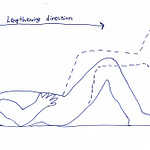Just a reminder that Your Body Is Your Practice is rolling again, Mondays at 8 PM.
This week, I’m excited to introduce you to Ralph de la Rosa, a trauma-focused psychotherapist, seasoned meditation instructor, and the recent author of Don’t Tell Me to Relax: Emotional Resilience in the Age of Rage, Feels, and Freak-Outs.
I talked with Ralph about his unconventional views on dealing with strong emotions and how he has connected his psychotherapeutic training with Buddhism to help people suffering from childhood trauma, anxiety, depression, and addiction issues (among others).
You can listen to the 25-minute interview above or read the main points of our conversation below.
(1:00) Ralph was exposed to a number of spiritual perspectives: he grew up in a Southern Baptist household, was a Hare Krishna monk for a short while, studied under, and traveled with, Amma (also known as the “Hugging Saint”), and later discovered Buddhism in 2005.
“I was hungry for truth, but also hungry for relief,” he says. Suffering from PTSD and other undiagnosed mental health issues, Ralph began compensating for emotional issues with drugs until he finally bottomed out. He ended up in a residential treatment center, “and not a nice one.” There, in a room with three men recently released from San Quentin prison, Ralph began to address his situation more directly.
“How do I just be in this body, work with these thoughts, and these terrible, eclipsing emotions?”
(6:10) Ralph introduces the Internal Family Systems model of psychotherapy. “There’s a way to work with your anxiety, pain, and your wounded inner children without re-traumatizing yourself. When we can get curious about the experience of affliction, that afflicted state can, in effect, become a teacher to us.”
(8:49) As in the Alexander Technique, Ralph says that, in his work, “the path is, counterintuitively, to explore, to be right there in [one’s difficulties) in a non-goal-oriented way…It’s just genuine presence.”
(11:05) “We often find that angry parts of us are protecting more wounded or vulnerable parts.”
(19:17) Ralph talks about his course “Unstuck,” which is a blend of Internal Family Systems and Tibetan and Buddhist approaches to meditation. He explains how his approach can help turn one’s meditation session into a kind of self-therapy or, at least, a safe space. (NOTE: Unfortunately, the release of this interview was delayed because of my dealing with COVID-19 and “Unstuck” has passed. Stay tuned to Ralph for future offerings!)
(21:56) Lastly, Ralph and I discussed social justice in the context of Buddhist and spiritual communities. I asked if there has not been enough anger in Buddhist communities about the state of the world?
“The center of the spiritual life is love and compassion, regardless of your tradition. Compassion literally means you see suffering and want to do something about it. How can we have a spiritual practice that isn’t willing to open to the tragedies and travesties around us (and take concrete action)? Otherwise, it’s incomplete, frankly.”
After all, “anger wants something that’s not safe to be safer.”
You can learn more about Ralph’s work and offerings by signing up for his newsletter or reading one of his approachable books. He’s a funny and genuine writer.
Until next time, let’s be curious about the different parts of us. That which gets nervous, excited, or confused. Can we have a handful of empathy for those parts of us?
In health,
Dan







